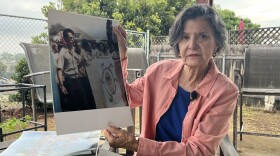Next summer, in addition to textbooks, laptops and double-strength coffee, Kansas college students will be able to bring something else to class: guns.
By July 2017, all six state universities plus dozens of community colleges and technical schools must allow students to carry concealed weapons on campus.
The reason for the change was simple: to make schools safer.
"When a gun is in a school and harm is meant, there is only one thing that is going to stop that, and that is another gun," said state Sen. Forrest Knox, a Republican from rural southeast Kansas, during debate on the proposal.
While the move enjoys broad support in the Kansas Legislature, it's a different story among the state's professors and administrators.
Mike Williams, president of the University of Kansas Faculty Senate, says his colleagues are less worried about the possibility of an active shooter and more about accidents and simple disagreements escalating between armed students.
What's more, Williams says, that fear of violence could discourage civil discourse, with students afraid to speak their minds "because of their worry that someone might react with armed violence instead of thoughtful debate."
A poll of more than 20,000 employees across all Kansas Board of Regents schools found overwhelming disapproval of the new law. Eighty-two percent said they would feel less safe if students were allowed to carry guns to class.
The survey also found:
- Overall, 70 percent of respondents said allowing guns on campus would negatively impact their course and how they teach; 20 percent disagreed.
- Two-thirds said allowing guns would limit their freedom to teach the material and engage with students in a way that optimizes learning, while 24 percent disagreed.
- Nearly half said allowing concealed weapons would increase crime on campus. Just 16 percent thought it would do the opposite.
But the law is the law, and Williams says his job now is to prepare for armed students and staff on campus and to find ways to "make the environment that we live and work and try to learn in as safe and unthreatening as possible."
The Legislature did give schools an alternative. If they want to keep guns out of a building, every door must have metal detectors and security guards.
But, with more than 800 buildings on just the six university campuses alone, that alternative is prohibitively expensive. One community college in suburban Kansas City — a campus far smaller than the smallest of the state's university campuses — put the cost of guarded doors at $20 million.
Nowhere is the law's implementation more hotly debated than at the University of Kansas Medical Center in Kansas City, Kansas.
"There are concerns in a high stress, high risk environment like healthcare," says Medical Center Executive Vice Chancellor Doug Girod.
Almost 7,000 students and staff — not to mention patients and family members — pass through the hospital complex's doors every day. Once inside, they enter a maze of hallways that connect classrooms, offices and clinics.
"We have some vulnerable populations that are harder to protect," Girod says. In the event of violence, "we've got patients stuck in a hospital, they aren't going to get up and flee. We have children. We have pregnant mothers. The spectrum is very broad, so healthcare is certainly a unique environment."
And some doctors worry because, they say, conflict is part of the job.
"There's a lot of confrontation that happens in health care," says Allen Greiner, a family medicine doctor who has been on the faculty for 18 years. "Between groups of patients, inside of families, between providers and patients. Between providers and providers."
Greiner says guns are probably already being carried into the hospital, but he thinks the law could make it more common and gun-related injuries more likely.
He's not alone.
Erin Corriveau joined the faculty about a year ago and is also a family doctor. Inviting guns on campus, she says, could drive her and other colleagues away.
"I think a lot of faculty members will consider moving on if this is enacted," Corriveau says. "I don't think this is smart for Kansas. I don't think this is the best thing for the health of our population."
This debate isn't specific to Kansas. After Texas recently passed a similar law, Fritz Steiner, the dean of the architecture school at the University of Texas at Austin, announced he was leaving for a similar post at the University of Pennsylvania. His reason: the new law allowing guns in his classroom.
Texas is the eighth state to allow concealed weapons on its public, post-secondary campuses, according to the National Conference of State Legislatures. The other states are Mississippi, Colorado, Idaho, Oregon, Wisconsin, Utah and Kansas.
Back in Kansas, faculty concerns have largely fallen on deaf ears at the Statehouse. "Do you need security? Then you better get it," says Knox, one of the Legislature's leading gun advocates.
He says his daughter is an emergency room nurse at Truman Medical Center in Kansas City, Mo., and her experiences there just reinforce his thinking that everyone should be able to defend themselves.
"If you don't provide security, then you shouldn't deny the public's right to provide for their own," he says. "That's the logic of the bill, OK, and nothing has changed in that, whether it's a hospital or not."
Knox says he's willing to listen if officials at the University Medical Center complex want to restrict guns in the emergency room or patient rooms.
University Medical Center officials say they will probably hire more police officers to patrol the 41-acre complex and may spend the extra money to restrict guns at the school's library.
Copyright 2016 KCUR-FM. To see more, visit KCUR-FM.






